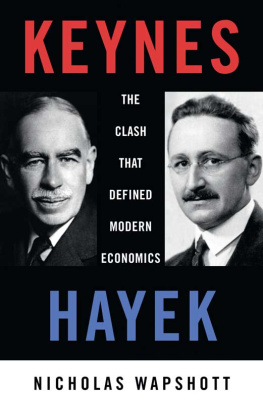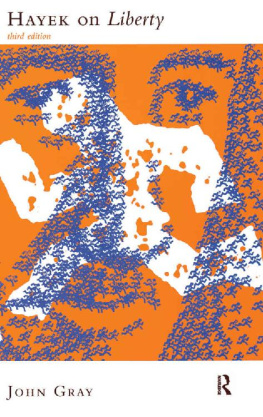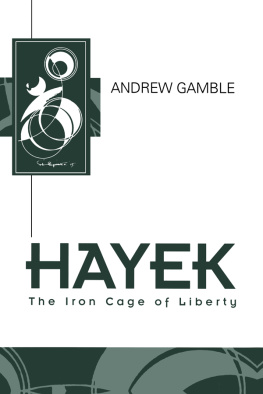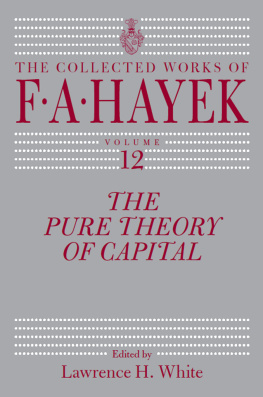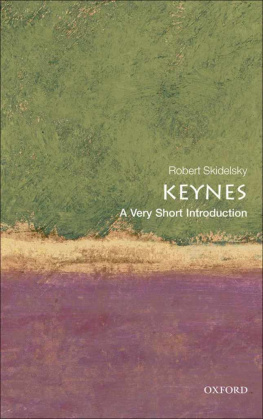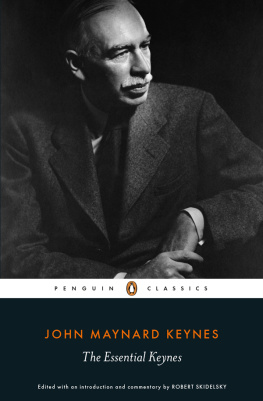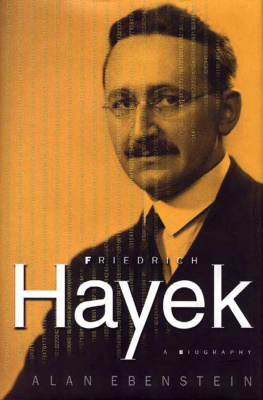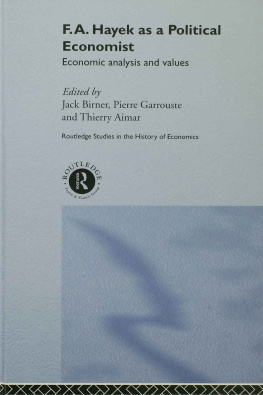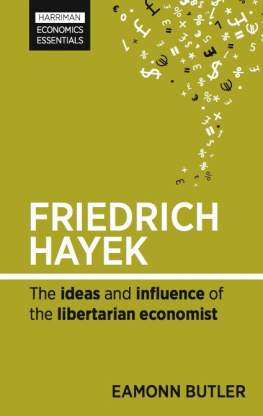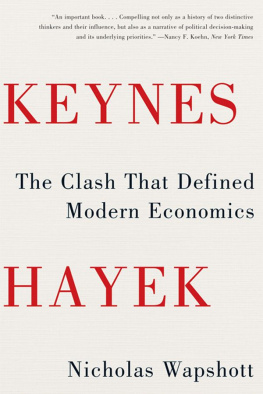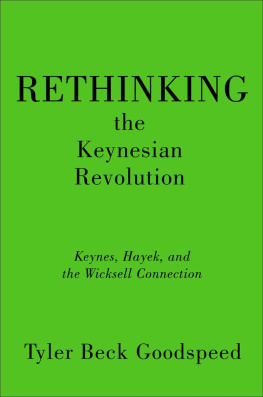
Scribe Publications
KEYNES / HAYEK
Nicholas Wapshott is a prominent British journalist and writer. He was a former senior editor at The Times of London and The New York Sun , as well as the founding editor of The Times Magazine . He is a Reuters contributing columnist and a regular broadcaster on MSNBC, PBS, and FOX News. Wapshott has written a number of biographies, including those of Margaret Thatcher and Carol Reed. He lives in New York.
Scribe Publications Pty Ltd
1820 Edward St, Brunswick, Victoria, Australia 3056
Email: info@scribepub.com.au
First published in the United States by W. W. Norton & Company, Inc., 2011
Published in Australia and New Zealand by Scribe 2011
Copyright Nicholas Wapshott 2011
All rights reserved. Without limiting the rights under copyright reserved above, no part of this publication may be reproduced, stored in or introduced into a retrieval system, or transmitted, in any form or by any means (electronic, mechanical, photocopying, recording or otherwise) without the prior written permission of the publishers of this book.
National Library of Australia
Cataloguing-in-Publication data
Wapshott, Nicholas.
Keynes/Hayek: the clash that defined modern economics.
9781921942266 (e-book.)
1. Hayek, Friedrich A. von (Friedrich August), 1899-1992Influence. 2. Keynes, John Maynard, 1883-1946Influence. 3. Economic policyPolitical aspects. 4. Free enterprise. 5. Financial crisesEconomic aspects. 6. Economic policy21st century.
www.scribepublications.com.au
TO ANTHONY HOWARD
CONTENTS
ONE
How Keynes Became Hayeks Idol, 191927
TWO
Hayek Experiences Hyperinflation Firsthand, 191924
THREE
Keynes Denies the Natural Order of Economics, 192329
FOUR
Keynes and Hayek Meet for the First Time, 192830
FIVE
Hayek Arrives from Vienna, 1931
SIX
Hayek Harshly Reviews Keyness Treatise , 1931
SEVEN
Keynes and Hayek Lock Horns, 1931
EIGHT
Keynes Asks Piero Sraffa to Continue the Debate, 1932
NINE
The Cost-Free Cure for Unemployment, 193233
TEN
The General Theory Invites a Response, 193236
ELEVEN
Roosevelt and the Young New Deal Economists, 1936
TWELVE
Hayek Writes His Own General Theory, 193641
THIRTEEN
Hayek Links Keyness Remedies to Tyranny, 193746
FOURTEEN
Mont-Plerin and Hayeks Move to Chicago, 194469
FIFTEEN
Three Decades of Unrivalled American Prosperity, 194680
SIXTEEN
Friedman, Goldwater, Thatcher, and Reagan, 196388
SEVENTEEN
Freshwater and Saltwater Economists, 19892008
EIGHTEEN
Avoiding the Great Recession, 2008 Onward
PREFACE
It was, perhaps, the most unusual episode in the long-running duel between the two giants of twentieth-century economic thought. During World War II, John Maynard Keynes and Friedrich Hayek spent all night together, alone, on the roof of the chapel of Kings College, Cambridge. Their task was to gaze at the skies and watch for German bombers aiming to pour incendiary bombs on the small picturesque cities of England.
In the spring and summer of 1942, in retaliation against British bombing of the medieval cities Lbeck, which sheltered a U-boat lair, and Rostock, home to the Heinkel bomber works, German planes bombed a string of English cities that held no strategic value. Exeter, Bath, and York endured flamestorms that put their ancient buildings at risk. The British headline writers came up with the phrase The Baedeker Blitz because it seemed the Luftwaffe planners were selecting British targets by consulting the German guidebook that rated cities according to their cultural worth. Though Cambridge held few important war industries, it warranted its place on the Nazi menu of devastation for its collegiate university founded in the Middle Ages.
Night after night the faculty and students of Kings, armed with shovels, took turns to man the roof of the ornate Gothic chapel, whose foundation stone was laid by Henry VI in 1441. The fire watchmen of St. Pauls Cathedral in London had discovered that there was no recourse against an exploding bomb, but if an incendiary could be tipped over the edge of the parapet before it set fire to the roof, damage could be kept to a minimum. And so Keynes, just short of sixty years old, and Hayek, age forty-one, sat and waited for the impending German onslaught, their shovels propped against the limestone balustrade. They were joined by a common fear that they would not emerge brave or nimble enough to save their venerable stone charge.
It was particularly fitting that the two economists should defy the Nazi peril, for both, in different ways, had foreseen the coming of the national socialist tyranny and presaged the rise of Hitler. Keynes was a young economic don at Kings when, at the outbreak of World War I, he was recruited by the Treasury, the British finance ministry, to raise money from Wall Street to finance the Allies efforts. Once the war was brought to an end in 1918, Keynes was kept on to advise how best to squeeze reparations from the defeated Germans.
What Keynes found at the peace talks in Paris shocked him. While the victorious Allied leaders, sparked by vengeance, relished the misery they hoped to inflict on the German nation by severe financial penalties, Keynes saw the issue in a quite different light. He believed that to deliberately beggar a modern trading nation like Germany was to impose crippling poverty on its citizens, which would provide the conditions for extreme politics, insurrection, even revolution. Rather than bringing a just end to World War I, Keynes thought the Treaty of Versailles was planting the seeds of World War II. Back home, he penned The Economic Consequences of the Peace , a devastating indictment of the folly of the Allied leaders. The book was a best seller worldwide and propelled Keynes into the international limelight as an economist with the common touch.
Keyness caustic eloquence was not lost on Hayek, a young soldier in the Austrian army on the Italian front who returned to find his home city of Vienna devastated and its peoples confidence broken. Hayek and his family suffered from the precipitous inflation that soon beset the Austrian economy. He saw his parents savings melt away, an experience that was to permanently harden him against those who advocated inflation as a cure for a broken economy. He was determined to prove that there were no simple solutions to intractable economic problems, and came to believe that those who advocated large-scale public spending programs to cure unemployment were inviting not just uncontrollable inflation but political tyranny.
Although both Keynes and Hayek agreed on the shortcomings of the Versailles peace treaty, they went on to spend most of the 1930s arguing over the future of economics. Before long, their disagreement included the role of government itself and the threat to individual liberties of intervening in the market. The debate was heated and ill-mannered and took on the spirit of a religious feud. When the 1929 stock market crash triggered the Great Depression, the two men provided competing claims on how best to restore health to the shattered world economy. Though the pair eventually agreed to disagree, their ardent disciples continued the fierce battle long after the two men died.
In September 2008, another Wall Street crash took place and another world financial crisis erupted. President George W. Bush, an ostensible adherent of Hayeks views on the sanctity of the free market, was faced with a stark choice: to watch while the market came to rest with a depression that might rival the one of nearly eighty years before, or to speedily adopt Keynesian remedies to spend trillions of borrowed government dollars to save the sinking economy from more harm. So alarming was the prospect of letting the free market do its worst that, with barely a second thought, Bush abandoned Hayek and embraced Keynes. The election of a new president, Barack Obama, oversaw further vast injections of borrowed money into the economy. But before the stimulus funds were fully spent, there was a violent popular reaction against incurring such unprecedented levels of public debt. The Tea Party movement rose to demand that the administration change its course. Hank, the American people dont like bailouts, Tea Party champion Sarah Palin scolded Treasury Secretary Henry Paulson in October 2008. Glenn Beck, the political commentator, revived the reputation of Hayek by drawing the attention of Americans to his neglected Road to Serfdom , and the long-forgotten Austrian rose to the top of the book sales charts. Keynes was now out and Hayek in.
Next page
